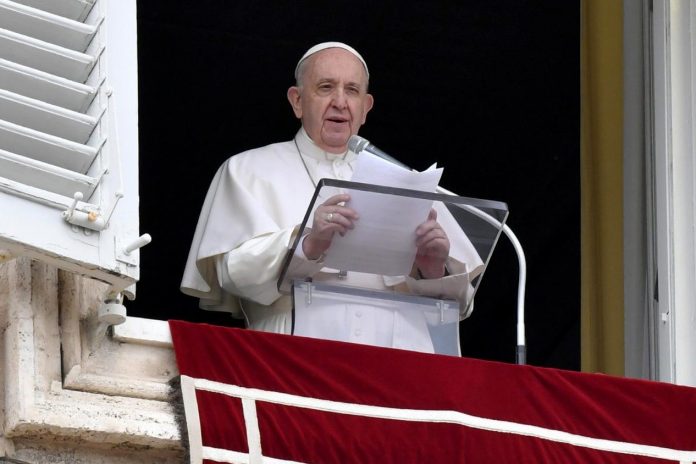Pope Francis urged Catholics to be “more courageous” in tackling the crisis exposed by COVID-19.
In a message to participants in the 49th Social Week of Italian Catholics issued on Oct. 21, the pope underlined the importance of face-to-face meetings as the world struggles to emerge from the pandemic.
“This is all the more necessary in the context of the crisis generated by COVID, a crisis that is both health-related and social,” he wrote.
“In order to emerge from this crisis, Italian Catholics too must be more courageous. We cannot resign ourselves and sit back and watch, we cannot remain indifferent or apathetic without taking responsibility for others and for society. We are called to be the yeast that leavens the dough.”
The pope’s message — dated Oct. 4, the feast of St. Francis of Assisi — was addressed to Catholics gathering in Taranto, southern Italy, for an Oct. 21-24 meeting with the theme “The planet we hope for: Environment, work, future. Everything is connected.”
“The pandemic has shattered the illusion of our time that we can consider ourselves omnipotent, trampling on the land we inhabit and the environment we live in,” he said.
“To get back on our feet, we must convert to God and learn to make good use of his gifts, first and foremost creation. Let us not lack the courage for ecological conversion, but above all let us not lack the ardor of community conversion.”
The pope offered participants what he called three “road signs” as they walked “boldly along the road to hope.” He named them as “mindfulness of people at crossings,” “no parking,” and “the obligation to turn.”
Addressing the first sign, he said: “We encounter too many people who pass through our existences in conditions of despair: young people forced to leave their countries of origin to emigrate elsewhere, unemployed or exploited in an endless precariousness; women who have lost their jobs in the pandemic or who are forced to choose between motherhood or their profession; workers left at home without opportunities; poor people and migrants who are not welcomed and not integrated; elderly people abandoned to their loneliness; families who are victims of usury, gambling, and corruption; businesspeople in difficulty and subject to the abuse of the mafia; communities destroyed by fires…”
“But there are also so many sick people, adults and children, workers forced to do arduous or immoral work, often in conditions of precarious safety.”
“These are faces and stories that challenge us: we cannot remain indifferent. These brothers and sisters of ours are crucified and awaiting resurrection. May the imagination of the Spirit help us leave no stone unturned to ensure that their legitimate hopes are realized.”
Explaining the second sign, “no parking,” he said: “When we see dioceses, parishes, communities, associations, movements, ecclesial groups that are tired and discouraged, sometimes resigned in the face of complex situations, we see a Gospel that tends to fade away.”
“On the contrary, God’s love is never static or renunciatory, ‘love believes all things, hopes all things’ (1 Corinthians 13:7): it drives us on and forbids us to stop.”
He went on: “Let us not stay in sacristies, let us not form elitist groups that isolate themselves and close themselves off. Hope is always on the move and also passes through Christian communities, daughters of the resurrection, who go out, announce, share, endure and fight to build the Kingdom of God.”
“How wonderful it would be if, in the areas most marked by pollution and degradation, Christians did not limit themselves to denouncing, but took on the responsibility of creating networks of redemption.”
Referring to his 2015 encyclical Laudato si’, he emphasized that half measures would “simply delay the inevitable disaster.”
Turning to the final sign, “the obligation to turn,” he said that the world’s poor and the Earth itself were crying out for change.
He quoted the Italian Bishop Antonio Bello (1935-1993), who he described as “a prophet in the land of Puglia,” the region at the southeastern tip of the Italian Peninsula.
He recalled that Bello often repeated that “We cannot limit ourselves to hope. We must organize hope!”
“A profound conversion awaits us, which touches the human ecology, the ecology of the heart, even before environmental ecology,” the pope commented.
“The turning point will only come if we know how to train consciences not to look for easy solutions to protect those who are already secure, but to propose lasting processes of change for the benefit of the younger generations.”
“Such a conversion, aimed at a social ecology, can nourish this time that has been called one ‘of ecological transition,’ where the choices to be made cannot only be the result of new technological discoveries, but also of renewed social models.”
He added: “The epochal change we are going through demands a turning point. Let us look, in this sense, to many signs of hope, to many people whom I wish to thank because, often in industrious obscurity, they are working to promote a different economic model that is fairer and more attentive to people.”
The pope also sent a short video message encouraging young people taking part in the four-day event.
He said: “You are the present, you are the planet’s today, never feel on the margins of projects or reflections. Your dreams must be the dreams of all, and you have much to teach us about the environment.”









